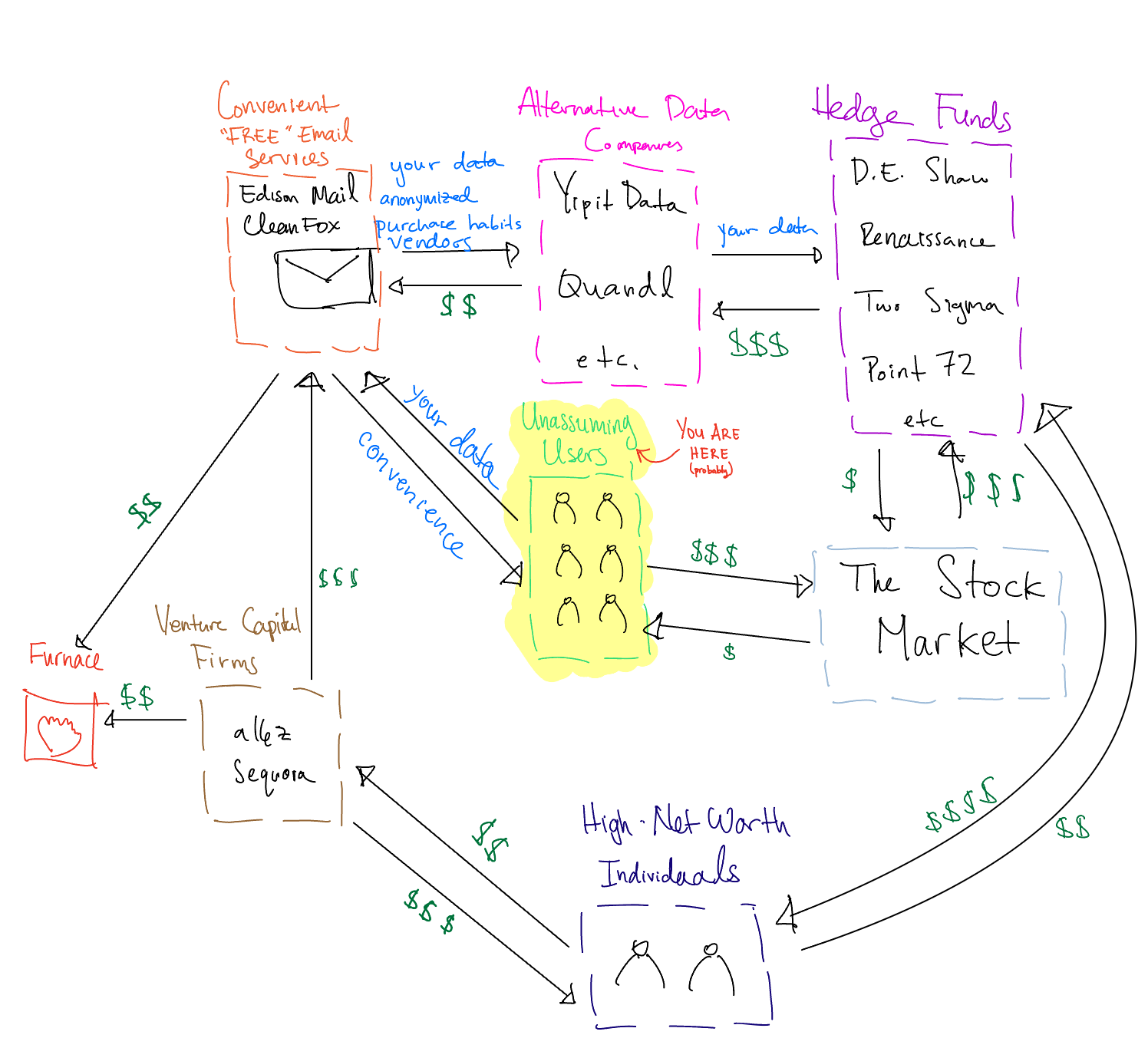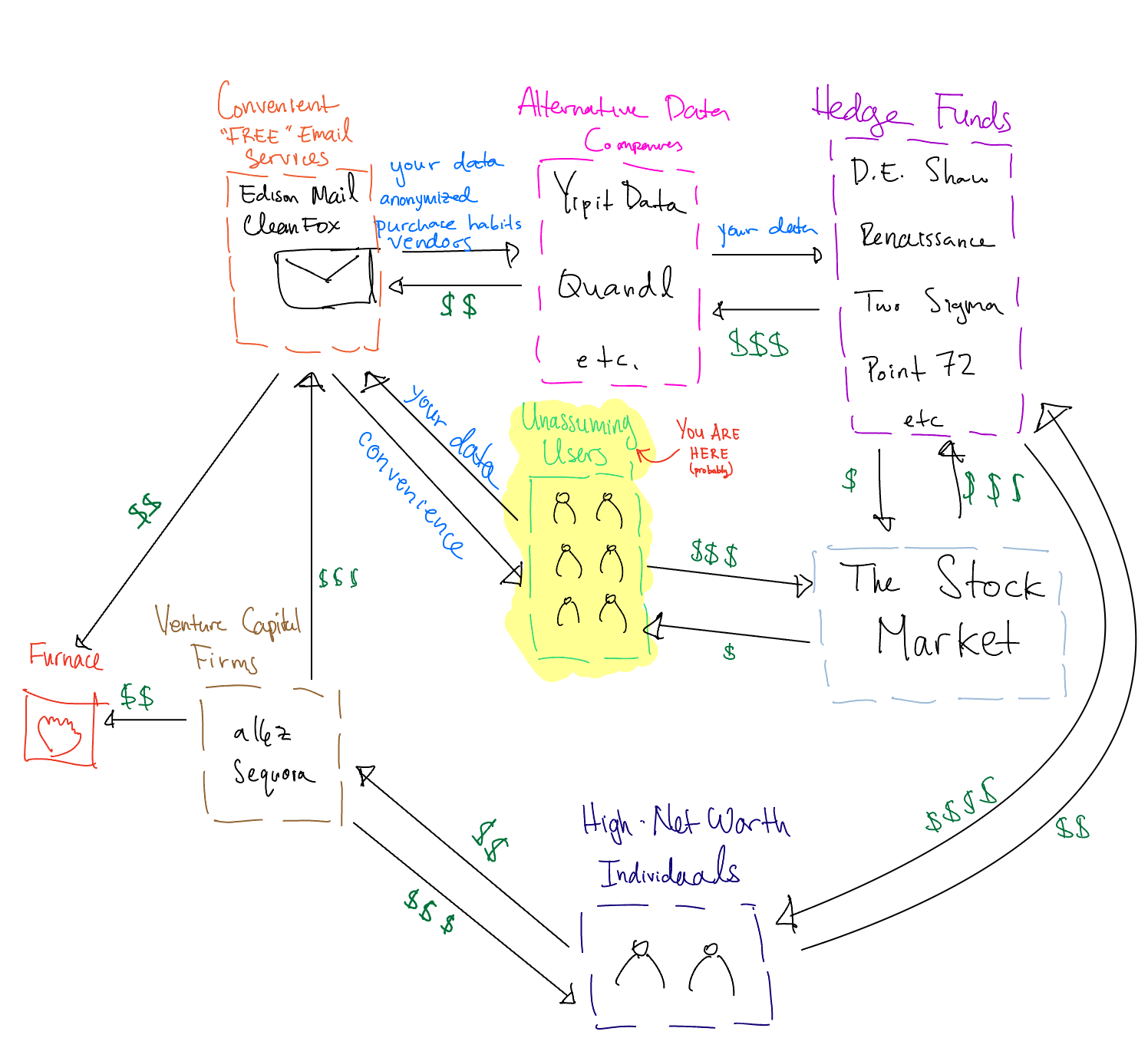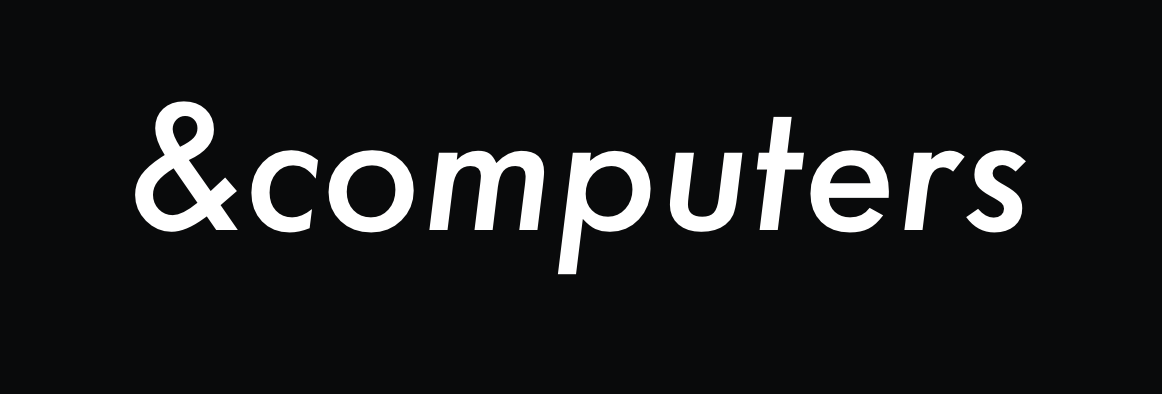This Is Why We Can't Have Free Things
Ironically, the same people (me) unknowingly providing the data to companies like YipitData, Quandl, and Thinknum are oftentimes the same people losing money on the other side of the stock market trades that they are empowering.

Late in 2021, the company that makes my favorite email application was acquired.
When I saw the headline, I figured they must have been purchased by a huge player in the e-mail or enterprise software space- like a Microsoft or Google or hell even Salesforce, idk. Any of those would have made sense.
So, when I saw that Edison Mail had been purchased by YipitData, I was like "wait, but why?"

Then it hit me.. (keep reading!)

What is YipitData
YipitData is a company that makes gobs of cash by selling alternative data to hedge funds to help them make better investment decisions. Alternative data is usually defined as data that comes from sources not directly related to a company's finances. These data source may include but are not limited to:
- data from airline booking systems
- social media posts
- satellite data
- mobile devices / sensor data
- email confirmation receipts & transactions
Aggregating this alternative data can help investors make decisions and predictions on where they think markets will move, thus allowing them to make trades with a higher likelihood of success than mostly everyone else.
So Why Did YipitData Just Buy an Email Company?
My guess is that the email receipts & transactions insights must have been a best-selling dataset for YipitData; as their purchase of Edison Mail effectively cuts out the middleman. By buying an email company* YipitData can get more types of data from our inboxes for cheaper, thus increasing their margins when they sell it to the hedge fund investors & consultants.
*is it really fair to call Edison Mail an email company?? I prefer "data-harvesting operation masquerading as a privacy-focused email app"
Information We Collect from the Services. We collect the content you create, upload, or receive when using our Services. This may include, for example, the email messages you send and receive. We also collect information from Commercial Messages (“Commercial Data”). “Commercial Messages” are emails you receive (including those you set up to auto-forward from another email account) from businesses related to commercial activities such as subscriptions, sign-ups/cancellations, account requests and confirmations, purchases, travel, reservations, event tickets, boarding passes, promotions, bills, and package shipments.
The Punchline
Ironically, the same people (me) unknowingly providing the data to companies like YipitData, Quandl, and Thinknum are oftentimes the same people losing money on the other side of the stock market trades that they are empowering. 🤯
To put it another way, we exchange the convenience/utility of free applications like EdisonMail & CleanFox for oodles of our personal-ish data. These free app companies then sell our data to companies that aggregate it (like YipitData). Those aggregators then sell it to hedge funds (like D.E. Shaw, Two Sigma, and Axe Capital) for more $$$. Those hedge funds then use that data to make very well-informed trades that us retail investors (the original free data providers) are often losing money on the other side of. Meaning for retail investors who use free products like these, we kind of are paying for them when we try to compete with institutional investors in the stock market.


But in the spirit of transparency, I do still use Edison Mail 😅. It's just so convenient 🥲. They say that they get rid of any personally identifiable information and only scrape information from email receipts... I don't really believe them, but I suppose that's the price I'm willing to pay.
The patent assigned to the Edison Software company that describes this process is unsurprisingly non-specific about the type of data it extracts from messages.




"System for Extracting Data"
I'm not saying that this is a break through discovery or some unknown driver of income inequality; plenty of people have reported on data sharing practices of free apps. However, the news of the acquisition just feels more brazen, unfair, and perhaps even nefarious. As a consumer in 2022 I already assume that my data is being used for ads pretty much everywhere.
But Edison has no advertisements AND they offer premium paid versions of their products. Seeing that they have no built-in advertisements and a real product that end users could pay for made me assume that I was engaging in a simple freemium business transaction: they give me functional software and try to up-sell me with the hope that I eventually give them money.
Plus, so much of their branding centers on being privacy-focused that I just never would have suspected that selling data directly from their users inboxes was a main source of revenue for them. Had I dug a few links deeper into their page and read through everything I would have however come across their Edison Trends product which lays it all out. Hiding in plain sight.
As always, thanks for reading.

